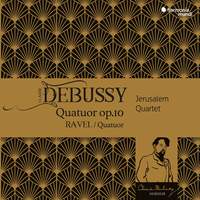Recording of the Week,
String Quartets by Debussy and Ravel from the Jerusalem Quartet
Perhaps the most notable of this year’s composer anniversaries relates to Claude Debussy, who died 100 years ago on 25th March 1918. The past few months have seen a plethora of recordings of his music, and one of the highlights for me so far has been a recording due out next week from the Jerusalem Quartet of the String Quartet, coupled with Maurice Ravel’s only offering in the same genre.
 The Jerusalem Quartet made their debut in 1996, and were one of the ensembles featured as BBC New Generation Artists back in 1999. Since then, they have amassed an admirable catalogue of quartets by Beethoven, Shostakovich, Bartók, Janáček, and many others.
The Jerusalem Quartet made their debut in 1996, and were one of the ensembles featured as BBC New Generation Artists back in 1999. Since then, they have amassed an admirable catalogue of quartets by Beethoven, Shostakovich, Bartók, Janáček, and many others.
I think I’m right in saying that apart from one change of viola player a few years ago, the quartet’s personnel has remained exactly the same from its formation to the present day. I was not surprised at all to discover this, as this consistency and familiarity with each other’s style and temperament is plain to hear. The utter unanimity of attack and articulation (not to mention immaculate ensemble playing) could surely only come from players who have been performing together for as long as this. As you would expect from such a seasoned group, their mastery of rubato is impressive. They move as one, and yet there is space for individual instruments to rise out of the texture when appropriate.
On offer throughout both quartets is an extraordinary range of dynamics, from quiet passages that are almost impossibly hushed to some almighty pizzicato wallops towards the end of the Ravel. As striking as the group’s power in the loud bits certainly is, though, what kept me interested on repeated listenings was how they tackle passages such as the third movement of the Debussy. Their group playing is spellbinding, drawing you in because of how quiet it is. Using vibrato as an expressive effect, their control over tone and phrasing even in the gentlest passages is remarkable. Just when you thought it couldn’t get any softer, along come the final four bars of this movement (marked “pp que possible”), and the way that the beautifully-balanced final chord fades away is an exquisite moment.
This abundance of expression carries over into the Ravel, where the dissonances of the third movement are handled most affectingly. As in the Debussy, their voicing of quiet chords is joyous. The second movement is great fun, with the players making the most of the interplay between the cross-rhythms. Again, the tempo shifts are handled with perfect concord, and the balancing of the various lines is just right, where every now and again a cheeky pizzicato will break out from amongst the arco textures.
The quartet has recorded the Ravel before, quite early in their existence. It’s fascinating to compare the two and to hear how they have developed as an ensemble. In terms of speeds there’s not a huge amount of difference, with the newer account being a mere minute or so faster overall, and yet in the second movement especially it’s clear how much more stylish and assured their playing has become, a notch faster than all those years ago, to be sure, but more importantly there’s a confidence and occasionally a relaxed swagger that is delightful. Similarly, an added sheen in the first movement and a huskiness in the third movement make this new version extremely worthwhile even if you already own the earlier account. In any case, if you’re a fan of this group then you’ll definitely want to hear this terrific performance of Debussy’s quartet.
Jerusalem Quartet
Available Formats: CD, MP3, FLAC, Hi-Res FLAC



